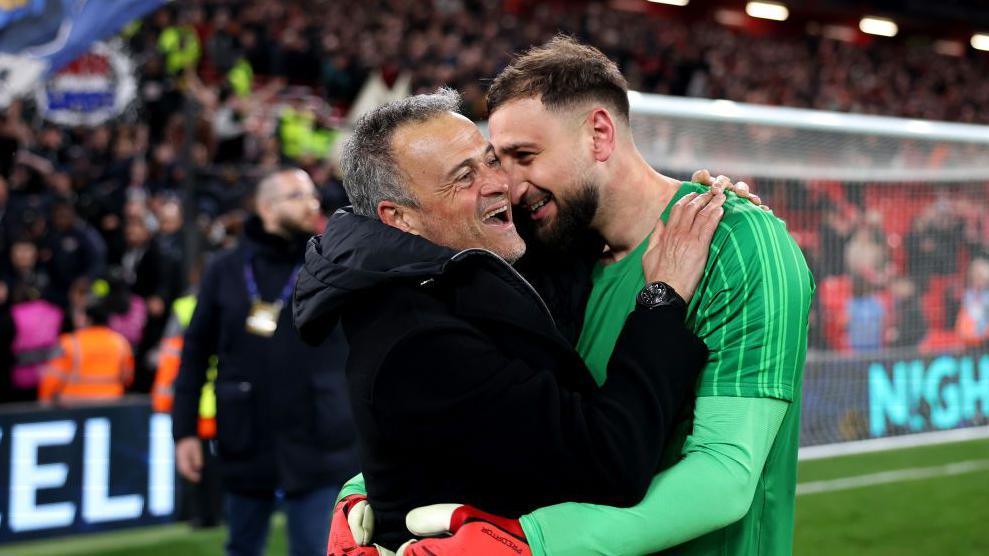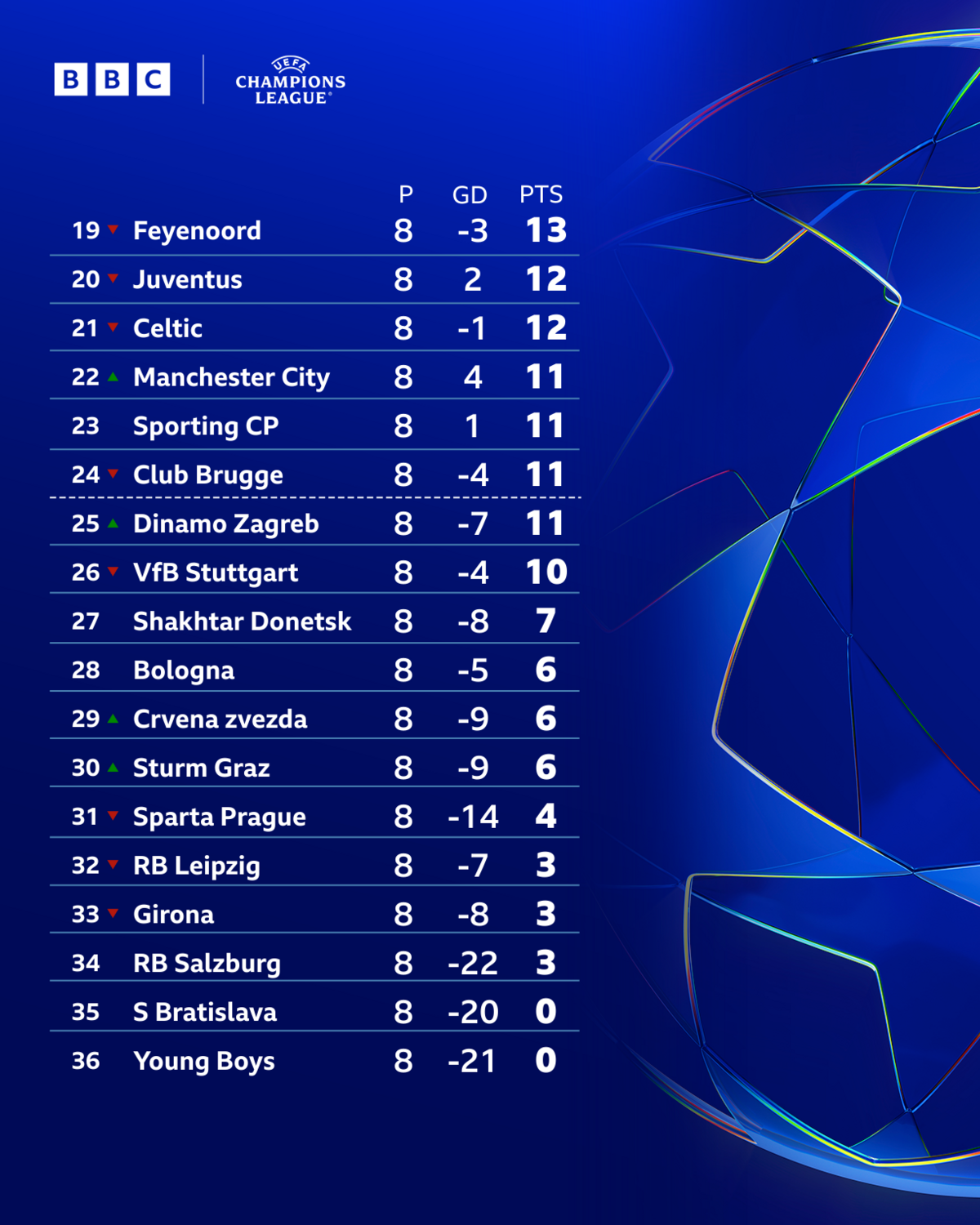It suited PSG, but was new Champions League format a success?
A 'new era' of the Champions League - all you need to know
- Published
The Champions League campaign has ended with a new winner of the trophy in the shape of Paris St-Germain.
This season represented the competition's biggest change of format since the group stage was introduced in the 1991-92 season.
Since then, the competition has featured some combination of groups of four teams, playing each other home and away, before a knockout stage (or straight final in 91-92 and 92-93).
This season, the expanded 36-team tournament saw each side play eight different teams - four at home and four away - in one big league phase.
It reached its climax at the end of January before the traditional knockout stages got under way, but was it a success?
PSG would say so after lifting their maiden Champions League trophy in Munich having initially finished 15th in the league phase and needing to progress via a play-off to reach the knockouts proper.

Image caption, PSG secured 15th place in the league phase while Inter finished fourth
1 of 2
'It doesn't matter if you don't make the top eight'
Former Manchester City defender Nedum Onuoha was complimentary of the new format and believes it has been a success.
"I've enjoyed it," Onuoha told BBC Sport. "There were lots of good games in the group stage and lots of big moments, and not just when the big teams have played each other either.
"The biggest change for me was that teams only played each other once in the league stage. It meant no-one lived or died by that result, and also the energy from the lesser teams was very different to when teams knew they would play each other again in a few weeks' time.
"Aston Villa beating Bayern Munich was a good example. Bayern did not get a second chance against them, when they probably would not have slipped up again - but they were still able to claw back the points they dropped."
Eventual champions PSG lost three of their opening five games, before a late resurgence saw them win their next three matches to secure a play-off tie with fellow Ligue 1 side Brest.
After winning that, Luis Enrique's side met Liverpool, the team who finished top of the league phase, in the last 16.
"While PSG are clearly a top-quality side, their journey shows that finding form at the right time is what matters," added Onuoha. "They were out of the top 24 until they won their penultimate game, and then got through the play-off stage.
"That's another thing I like about the format, because PSG have shown that in the future, it doesn't matter if you don't make the top eight."
Journalist Nicky Bandini made a fine point about the new format benefitting Luis Enrique's side.
"Without this format, we would maybe not have seen this PSG team that has developed during the season because they could have gone out," said Bandini. "This way we get to see them progress, and it feels like a more entertaining journey.
"Always so much in the Champions League has been about coming good at the right time - it has always been about what's your form like in the spring rather than your form at the start of the tournament.
"But I do think with the extra games this year, and with the very specific journey we have seen PSG go on, you really have been able to observe this development in real time."

Gianluigi Donnarumma was instrumental as PSG beat Liverpool on penalties in the last 16
Aside from Liverpool's early exit, the seeding system seemed to work with Barcelona (second), Arsenal (third) and Inter (fourth) all making at least the semi-finals.
For Inter, a fourth-placed finish meant they were faced with a favourable tie with Feyenoord in the last 16 before taking on Bayern Munich and Barcelona in the last eight and semi-finals.
More excitement and jeopardy?
Unlike previous editions, where many teams had already secured qualification or elimination before the final round, this year's league phase delivered a far more unpredictable, thrilling, and emotionally charged conclusion.
Going into the final group games last season, 13 teams had already secured qualification for the last 16.
But this term, only Liverpool and Barcelona were guaranteed a place in the last 16 - gained by finishing in the top eight places in the league.
So with 27 teams still having something on the line an exciting finale to the league phase was anticipated.
The league phase featured rematches of four of the last five Champions League finals with Arsenal midfielder Declan Rice saying: "Usually, you find these games in the quarter-finals or semi-finals."
Manchester City were the big story of the league phase with three points needed on the final league phase game to book their spot in a play-off - where they were beaten by Real Madrid in a thrilling contest.
By creating a format where teams played eight different opponents in a league stage that culminated with 64 goals in the final 18 matches, Uefa decision-makers will perhaps feel they have countered suggestions that the previous group stage could be repetitive at times, with big names always progressing.
'Every game counts' or does it?
Uefa claimed the new format would ensure every match has the potential to significantly impact a team's final standing. "Every game counts" was the precise wording used.
On one hand, only two games on matchday eight were true dead rubbers - Young Boys (36th) v Crvena zvezda (32nd) and Sturm Graz (33rd) v RB Leipzig (30th). The other teams all had something to play for, even if that meant just fighting for position. If that is taken in isolation, that is a clear selling point for this latest format.
On the other hand, nine teams had already been eliminated going into the final matchday, with Shakhtar Donetsk also practically out, needing to beat Borussia Dortmund and benefit from an improbable five-goal swing to qualify.
With 24 of the 36 teams either qualifying for the last 16 straight from the league phase or into a play-off, genuine jeopardy was at a minimum. Manchester City made it through despite a run that saw them lose three out of four games.
